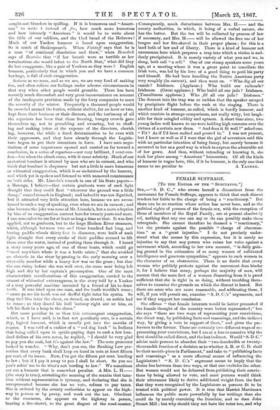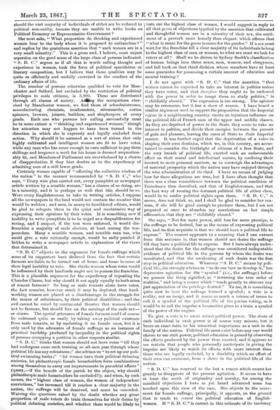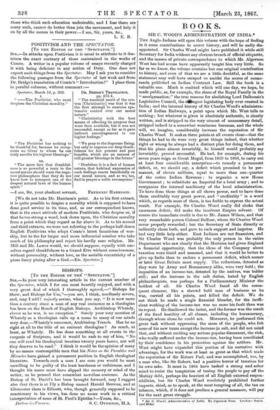renders her liable to the charge of being a "reactionary."
But there can be no reaction where action has never been, and as the political rights of persons of the female sex, with the exception of those of members of the Royal Family, are at present absolutely nil, nothing that any one can say or do can possibly make them retrograde. She cannot therefore be deemed a "reactionary," but she protests against the possible "charge of obscuran- tism" as a "great injustice." I do not precisely under- stand what she means by this expression, but it is surely no injustice to say that any person who raises her voice against a movement which, according to her own account, "is daily gain- ing ground in the estimation of so many women of cultivated intelligence and generous sympathies," appears to such women in the character of an obstructive. There is no doubt that every woman who publicly protests against the movement does hinder it, for I believe that many, perhaps the majority of men, will assume that the mere fact of a woman dissenting from it is proof sufficient that she is right in so doing, without troubling them- selves to examine the grounds on which the dissent is based. But there are some who are more reasonable, and addressing these, I will, if you will permit me, examine " S. D. C.'s" arguments, and see if they support her conclusion.
She affirms "that female interests would be better promoted if the female thought of the country were better represented ;" but she says "there are two -ways of representing your convictions, the direct way, by publishing facts and reasonings, and the indirect way, by giving a vote in support of them," and gives the pre- ference to the former. These are certainly two different ways of re- presenting your convictions, but I am at a loss to conceive why the first should be called direct, and the last indirect. Would " S.D. C."
advise male persons to abandon their "two-hundredth or twenty- thousandth fraction of a decision as to whether A. B. or C. D. shall be their mouth-piece in Parliament," and take to "publishing facts and reasonings" as a more effectual means of influencing the Legislature? "S. D. C.'s " argument seems to imply that the choice lies between these two ways, or that one excludes the other. But women would not be debarred from publishing their convic- tions by being allowed to vote, and most persons would think their utterances likely to derive additional weight from the fact that they were recognized by the Legislature as persons fit to be trusted with political power. it is true that Harriet Martineau influences the public more powerfully by her writings than she could do by merely exercising the franchise, and so does John Stuart Mill ; but why should they not have the votes too, and why should the vast majority of individuals of either sex be reduced to political non-entity, because they are unable to write books on Political Economy or Representative Government ?
She next asks, "What proportion do thinking and experienced women bear to the body whom it is proposed to enfranchise? "
and replies by the gratuitous assertion that "such women are in a very small minority." This is a gross and, I believe, most unjust aspersion on the good sense of the large class of persons indicated.
"S. D. C." argues as if all that is worth calling thought and experience in women, took the form of political speculation or literary composition, but I believe that these qualities may be quite as efficiently and usefully exercised in the conduct of the ordinary affairs of life.
The number of persons otherwise qualified to vote for Man- chester and Salford, but excluded by the restriction of political privileges to male citizens, is 3,900. These are distributed through all classes of society. Allkig the occupations exer- cised by Manchester women, we find those of schoolmistresses, manufacturing chemists, ironfounders, silversmiths, cotton spinners, brewers, joiners, builders, and shopkeepers of every grade. Each one who pursues her calling successfully must be to some extent a "thinking and experienced woman," though her attention may not happen to have been turned in the direction in which she is expressly and legally excluded from action. Why should it be assumed as a sort of axiom that only highly cultivated and intelligent women are fit to have votes, while any man who has sense enough to earn sufficient to pay three shillings and tenpence a week for his house is deemed unquestion- ably fit, and Members of Parliament are overwhelmed by a chorus of disapprobation if they hint doubts as to the expediency of admitting men of a still lower grade.
Certainly women capable of "affecting the collective wisdom of the nation" in the manner recommended by "S. D. C.," who says, "Every wise plan carried out, every pamphlet or newspaper article written by a sensible woman," has a chance of so doing, are in a minority, and it is perhaps as well that this should be so. Were every Englishwoman to take to writing articles, I suppose all the newspapers in the land would not contain the number that would be written ; and men, in mercy to bewildered editors, would be glad to relegate them to the quiet and unobtrusive way of expressing their opinions by their votes. It is something new if inability to write pamphlets is to be urged as a disqualification for voting, and I suspect, if the test were enforced, it would dis- franchise a majority of male electors, at least among the ten- pounders. Many a sensible woman, and sensible man too, who could give a vote rationally enough, would be sadly puzzled if bidden to write a newspaper article in explanation of the views that determined it.
"S. D. C." objects to the argument for female suffrage which some of its supporters have deduced from the fact that certain farmers are liable to be turned out of house and home because of their legal inability to vote. She thinks women whose votes would be influenced by their landlords ought not to possess the franchise. This is a plausible argument for the expediency of repealing the Chandos Clause, but why should it not apply equally to both sexes of tenant farmers? So long as male tenants alone have votes, the fact remains, however much it may be deplored, that hard- working women are placed at a disadvantage in the struggle for the means of subsistence, by their political disabilities ; and the evil cannot be cured by sentimental theories that women should not be farmers, but should live on the earnings of the male sex— or starve. The special grievance of female farmers could of course be redressed quite as easily by taking away political existence from male tenants, as by conferring it on female ones, but it is only used by the advocates of female suffrage as an instance of practical hardship produced by inequality in the political rights of persons occupying a position in other respects similar.
"S. D. C." thinks that women should not have votes "till they had undergone some such training as all men pass through whose political life has any robustness ;" she advises us" to set up our poli- tical swimming baths ;" "let women have their political debating societies, let philanthropic female householders form combinations among themselves to carry out improvements in parochial affairs" (query,—if the benefit of the parish be the object, why should philanthropic male householders be excluded?); and when, by such means, the "highest class of women, the women of independent convictions," has increased till it reaches a clear majority in the nation, the suffrage will be deserved, and must be conceded. Waiving the questions raised by the doubt whether any great proportion of male voters do train themselves for their duties by political debating societies, and whether these would be likely to
turn out the highest class of women, I would suggest in reply to all that genus of objections typified by the assertion that cultivated and thoughtful women are iu a minority of their sex, the senti- ment of a proverb more homely than elegant, which affirms that "what is sauce for the goose is sauce for the gander." If a sex must wait for the franchise till a clear majority of its individuals belong to the highest class of men or women, to what sex must we look for voters at all ? Shall we be driven to Sydney Smith's classification of human beings into three sexes, men, women, and clergymen, and fall back on that third division whose members have at least some guarantee for possessing a certain amount of education and mental training ?
I do not agree with "S. D. C." that the assertion "that women cannot be expected to take an interest in politics unless they have votes, and that therefore they ought to be endowed with the power in order to tempt them to study politics," is "childishly absurd." The expression is too strong. The opinion may be erroneous, but it has a show of reason. I have heard a similar argument used to support the proposition that the Imperial regime in a neighbouring country exerts an injurious influence on the political life of French men of the upper and middle classes. As they are deprived of power in the State, they cease to take an interest in politics, and divide their energies between the pursuit of gain and pleasure, leaving the cares of State to their Imperial master. It was further urged that the deprivation of a voice in shaping their own destiniea, which we, in this country, are accus- tomed to consider the birthright of citizens of a free State, and the very breath of political life, exerted such an unfavourable effect on their moral and intellectual nature, by confining their interest to mere personal matters, as to outweigh the advantages of material prosperity which the nation may have enjoyed through the wise administration of its chief. I have no means of judging how far these allegations are true, but I have often thought that there was a close resemblance between the political condition of Frenchmen thus described, and that of Englishwomen, and that the best way of rousing the dormant political life of either class, would be to confer political rights upon them. "S. D. C.," it seems, does not think so, and I shall be glad to consider her rea- sons, if she will be good enough to produce them, but I am not prepared at once to abandon my convictions on her simple affirmation that they are "childishly absurd."
She says, "Not for mere power, still less for mere prestige, is the suffrage to be desired, but as the means of expressing political life, and its first requisite is that we should have a political life to express." The nearest approach to a meaning that I can extract from this sentence is, that women should not desire the suffrage till they have a political life to express. But I have always under- stood that the desire for the suffrage was considered indisputable evidence of political life in the persons by whom the desire was manifested, and that the awakening of such desire was the first step in political education. Whatever "S. D. C." means by poli- tical life, she strongly advises us "to do our best to develop it," but deprecates agitation for tins " symbol" (i.e., the suffrage) before we possess the thing signified, as "reversing the true order of realities," and being a course which "tends greatly to obscure any just appreciation of the privilege desired." To me, it is something quite new to hear the suffrage termed a symbol ; a vote is a reality, not an image, and it seems as much a misuse of terms to call it a symbol of the political life of the peision voting, as it would be to call the impulse a locomotive gives to a train a symbol of the power of the engine.
To give a vote is to exert actual political power. The share of each individual in such power is of course very minute, but it bears an exact ratio to his numerical importance as a unit in the family of the nation. Political life must exist before any one would choose to use such power, political education is gained by observing the effects produced by the power thus exerted, and it appears to me certain that people who personally participate in giving the impulse are likely to watch its effects with more interest than those who are legally excluded, by a disability which no effort of their own can overcome, from a share in the political life of the nation.
"S. D. C." has reserved to the last a reason which causes her greatly to disapprove of the present agitation. It seems to have at least the merit of originality and novelty, for among the manifold objections I have as yet heard advanced none has touched upon this view of the case. She objects to the move- ment for' female suffrage, principally, it appears, on the ground that it tends to retard the political education of English- women. If "S. 1). C." is correct in this estimate of its tendency those who think such education undesirable, and I fear there are many such, cannot do better than join the movement, and help it on by all the means in their power.—I am, Sir, yours, &c., L. E. B.
































 Previous page
Previous page